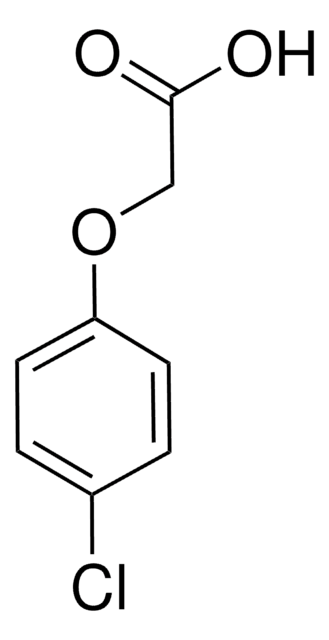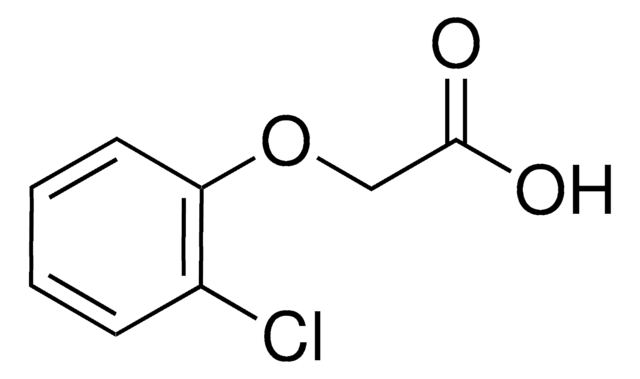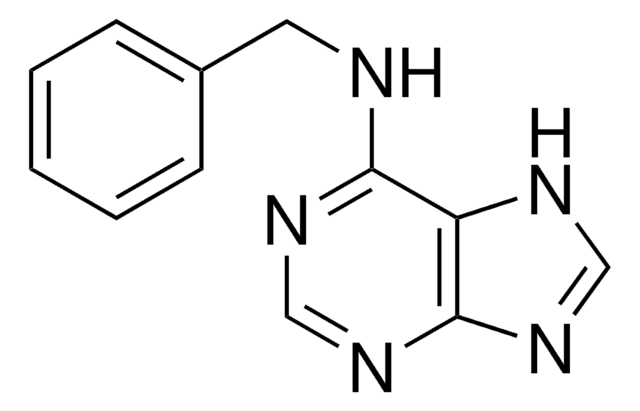25890
4-Chlorophenoxyacetic acid
≥98.0% (T)
Sinónimos:
4-CPA
Iniciar sesiónpara Ver la Fijación de precios por contrato y de la organización
About This Item
Fórmula empírica (notación de Hill):
C8H7ClO3
Número de CAS:
Peso molecular:
186.59
Beilstein:
1211804
Número CE:
Número MDL:
Código UNSPSC:
12352100
ID de la sustancia en PubChem:
NACRES:
NA.22
Productos recomendados
Ensayo
≥98.0% (T)
Formulario
powder
grupo funcional
carboxylic acid
chloro
cadena SMILES
OC(=O)COc1ccc(Cl)cc1
InChI
1S/C8H7ClO3/c9-6-1-3-7(4-2-6)12-5-8(10)11/h1-4H,5H2,(H,10,11)
Clave InChI
SODPIMGUZLOIPE-UHFFFAOYSA-N
¿Está buscando productos similares? Visita Guía de comparación de productos
Descripción general
4-Chlorophenoxyacetic acid is a herbicide. Degradation of 4-chlorophenoxyacetic acid in aqueous medium by advanced electrochemical oxidation processes, using an undivided cell containing a Pt anode has been reported.
Aplicación
- Innovative adsorbents for chemical analysis: The application of three-dimensional material CZIF-8/CS-MS was explored as adsorbents for the determination of plant growth regulators including 4-Chlorophenoxyacetic acid in traditional Chinese medicine, improving the precision and efficiency of chemical residue analysis (Zhang et al., 2024).
Palabra de señalización
Warning
Frases de peligro
Consejos de prudencia
Clasificaciones de peligro
Acute Tox. 4 Oral
Código de clase de almacenamiento
11 - Combustible Solids
Clase de riesgo para el agua (WGK)
WGK 1
Punto de inflamabilidad (°F)
Not applicable
Punto de inflamabilidad (°C)
Not applicable
Equipo de protección personal
dust mask type N95 (US), Eyeshields, Gloves
Elija entre una de las versiones más recientes:
¿Ya tiene este producto?
Encuentre la documentación para los productos que ha comprado recientemente en la Biblioteca de documentos.
Song Zhu et al.
Food science and biotechnology, 29(11), 1587-1595 (2020-10-23)
Determination of phytohormones have attracted increasing attentions in food safety field. In this study, an efficient and quantitative method was developed which can simultaneously determinate thirteen phytohormones in fruits and vegetables using solid phase extraction (SPE) combined with high performance
Sze Chieh Tan et al.
Talanta, 216, 120962-120962 (2020-05-28)
Two miniaturized sample preparation techniques, ultrasound-assisted emulsification microextraction (USAEME) and micro-solid-phase extraction (μ-SPE) have been integrated for the pre-concentration of four polar chlorophenoxy acid (CPA) herbicides from environmental aqueous samples. An metal-organic framework, MIL-101(Cr), characterized by its high porosity and
G Carbonara et al.
Farmaco (Societa chimica italiana : 1989), 56(10), 749-754 (2001-11-23)
2-(4-Chloro-phenoxy)propanoic and 2-(4-chloro-phenoxy)butanoic acids are compounds known to block chloride membrane conductance in rat striated muscle by interaction with a specific receptor. In the present study, a series of chiral analogues has been prepared and tested to evaluate the influence
K T Ranjit et al.
Environmental science & technology, 35(7), 1544-1549 (2001-05-12)
The photocatalytic degradation of p-chlorophenoxyacetic acid has been investigated in oxygenated aqueous suspensions of lanthanide oxide-doped TiO2 photocatalysts. Complete mineralization was achieved. The enhanced degradation is attributed to the formation of Lewis acid-base complex between the lanthanide ion and the
Birame Boye et al.
Environmental science & technology, 36(13), 3030-3035 (2002-07-30)
The herbicide 4-chlorophenoxyacetic acid (4-CPA) has been degraded in aqueous medium by advanced electrochemical oxidation processes such as electro-Fenton and photoelectro-Fenton with UV light, using an undivided cell containing a Pt anode. In these environmentally clean methods, the main oxidant
Nuestro equipo de científicos tiene experiencia en todas las áreas de investigación: Ciencias de la vida, Ciencia de los materiales, Síntesis química, Cromatografía, Analítica y muchas otras.
Póngase en contacto con el Servicio técnico







